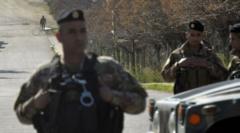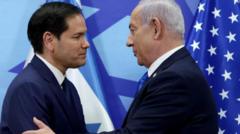This development comes amidst accusations and concerns over the fragility of the existing ceasefire agreement.
Hamas Names Hostages Set for Release Amid Ongoing Ceasefire Tensions

Hamas Names Hostages Set for Release Amid Ongoing Ceasefire Tensions
Hamas indicates three hostages will be released in a controversial exchange for Palestinian prisoners, igniting fears of renewed conflict.
Hamas has disclosed the names of three hostages planned for release on Saturday as part of an exchange for Palestinian prisoners held in Israel, following days of escalating tensions surrounding the ceasefire. The individuals listed are Russian-Israeli Alexander Troufanov, Argentinian-Israeli Yair Horn, and US-Israeli Sagui Dekel-Chen.
Israeli officials have issued stern warnings, indicating they will resume military action if the hostages are not released on schedule. This warning follows Hamas's announcement of a possible delay in the hostage release due to alleged breaches of the ceasefire by Israel. Former President Trump has also weighed in, asserting that the ceasefire should be abandoned if Hamas fails to return all hostages by the stipulated deadline.
Since the ceasefire began on 19 January, a total of 16 Israeli and five Thai hostages have been freed in exchange for 566 Palestinian prisoners. In the initial phase of the ceasefire, 33 hostages are projected to be released in return for approximately 1,900 Palestinian detainees held in Israel.
The conflict escalated significantly after Hamas's attack on Israel on 7 October 2023, resulting in around 1,200 fatalities and the abduction of 251 hostages. The ongoing Israeli offensive in Gaza has reportedly claimed more than 48,230 lives, according to data from the Hamas-run health ministry in the territory.
The ceasefire has faced persistent challenges since its commencement, with both parties retaliating against each other over alleged violations. Mediators from the United States, Egypt, and Qatar have been actively working to maintain the fragile agreement.
Israel has expressed frustration concerning the manner in which hostages have been released, highlighting the public display alongside armed militants and the chaotic scenes during their handover to the Red Cross. Conversely, Hamas has claimed that Israel is obstructing the intake of essential supplies into Gaza, failing to meet the aid requirements outlined in the ceasefire terms.
Israeli officials have issued stern warnings, indicating they will resume military action if the hostages are not released on schedule. This warning follows Hamas's announcement of a possible delay in the hostage release due to alleged breaches of the ceasefire by Israel. Former President Trump has also weighed in, asserting that the ceasefire should be abandoned if Hamas fails to return all hostages by the stipulated deadline.
Since the ceasefire began on 19 January, a total of 16 Israeli and five Thai hostages have been freed in exchange for 566 Palestinian prisoners. In the initial phase of the ceasefire, 33 hostages are projected to be released in return for approximately 1,900 Palestinian detainees held in Israel.
The conflict escalated significantly after Hamas's attack on Israel on 7 October 2023, resulting in around 1,200 fatalities and the abduction of 251 hostages. The ongoing Israeli offensive in Gaza has reportedly claimed more than 48,230 lives, according to data from the Hamas-run health ministry in the territory.
The ceasefire has faced persistent challenges since its commencement, with both parties retaliating against each other over alleged violations. Mediators from the United States, Egypt, and Qatar have been actively working to maintain the fragile agreement.
Israel has expressed frustration concerning the manner in which hostages have been released, highlighting the public display alongside armed militants and the chaotic scenes during their handover to the Red Cross. Conversely, Hamas has claimed that Israel is obstructing the intake of essential supplies into Gaza, failing to meet the aid requirements outlined in the ceasefire terms.



















